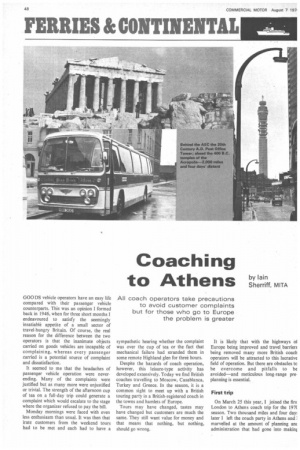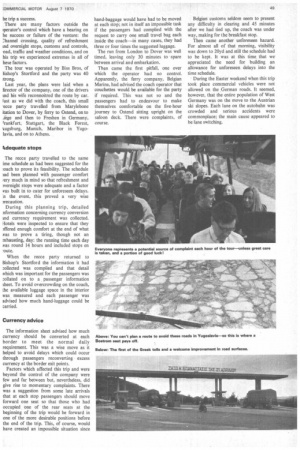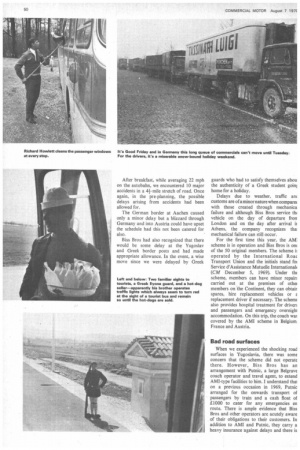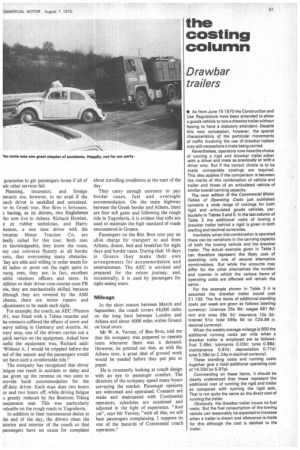Coaching to Athens
Page 50

Page 51

Page 52

Page 53

If you've noticed an error in this article please click here to report it so we can fix it.
All coach operators take precautions to avoid customer complaints but for those who go to Europe the problem is greater
GOODS vehicle operators have an easy life compared with their passenger vehicle counterparts. This was an opinion I formed back in 1946, when for three short months I endeavoured to satisfy the seemingly insatiable appetite of a small sector of travel-hungry Britain. Of course, the real reason for the difference between the two operators is that the inanimate objects carried on goods vehicles are incapable of complaining, whereas every passenger carried is a potential source of complaint and dissatisfaction.
It seemed to me that the headaches of passenger vehicle operation were neverending. Many of the complaints were justified but as many more were unjustified or trivial. The strength of the afternoon cup of tea on a full-day trip could generate a complaint which would escalate to the stage where the organizer refused to pay the bill.
Monday mornings were faced with even less enthusiasm than usual. It was then that irate customers from the weekend tours had to be met and each had to have a sympathetic hearing whether the complaint was over the cup of tea or the fact that mechanical failure had stranded them in some remote Highland glen for three hours.
Despite the hazards of coach operation, however, this leisure-type activity has developed extensively. Today we find British coaches travelling to Moscow, Casablanca, Turkey and Greece. In the season, it is a common sight to meet up with a British touring party in a British-registered coach in the towns and hamlets of Europe.
Tours may have changed, tastes may have changed but customers are much the same. They still want value for money and that means that nothing, but nothing, should go wrong. It is likely that with the highways of Europe being improved and travel barriers being removed many more British coach operators will be attracted to this lucrative field of operation. But there are obstacles to be overcome and pitfalls to be avoided—and meticulous long-range preplanning is essential.
First trip On March 25 this year, I joined the firs London to Athens coach trip for the 197( season. Two thousand miles and four day: later I left the coach party in Athens and 1 marvelled at the amount of planning ant administration that had gone into making he trip a success.
There are many factors outside the operator's control which have a bearing on he success or failure of the venture: the 7hannel crossing, quality of refreshment ind overnight stops, customs and controls, oad, traffic and weather conditions, and on his trip we experienced extremes in all of hese factors.
The tour was operated by Biss Bros, of lishop's Stortford and the party was 40 ;trong.
Last year, the plans were laid when a lirector of the company, one of the drivers ind his wife reconnoitred the route by car. lust as we did with the coach, this small .ecce party travelled from Marylebone Itation to Dover, by ferry to Ostend, on to ,i'ege and then to Freshen in Germany, 7rankfurt, Stuttgart, the Black Forest, .ugsburg, Munich, Maribor in Yugolavia, and on to Athens.
kdequate stops The recce party travelled to the same line schedule as had been suggested for the :oach to prove its feasibility. The schedule tad been planned with passenger comfort rery much in mind so that refreshment and wernight stops were adequate and a factor vas built in to cater for unforeseen delays. it the event, this proved a very wise trecaution.
During this planning trip, detailed nformation concerning currency conversion utd currency requirement was collected. Hotels were inspected to ensure that they 3ffered enough comfort at the end of what was to prove a tiring, though not an xhausting, day: the running time each day was round 14 hours and included stops en -oute.
When the recce party returned to Bishop's Stortford the information it had :ollected was compiled and that detail which was important for the passengers was :ollated on to a passenger information• sheet. To avoid overcrowding on the coach, the available luggage space in the interior was measured and each passenger was advised how much hand-luggage could be
Currency advice The information sheet advised how much currency should be converted at each border to meet the normal daily requirement. This was a wise move as it helped to avoid delays which could occur through passengers reconverting• excess currency at the border exit points.
Factors which affected this trip and were beyond the control of the company were few and far between but, nevertheless, did give rise to momentary complaints. There was a suggestion from some late arrivals that at each stop passengers should move forward one seat so that those who had occupied one of the rear seats at the beginning of the trip would be forward in one of the more desirable positions before the end of the trip. This, of course, would have created an impossible situation since hand-baggage would have had to be moved at each stop; not in itself an impossible task if the passengers had complied with the request to carry one small travel bag each inside the coach—in many cases, they had three or four times the suggested luggage.
The run from London to Dover was well timed, leaving only 30 minutes to spare between arrival and embarkation.
Then came the flrst pitfall, one over which the operator had no control. Apparently, the ferry company, Belgian Marine, had advised the coach operator that couchettes would be available for the party if required. This was not so and the passengers had to endeavour to make themselves comfortable on the five-hour journey to Ostend sitting upright on the saloon deck. There were complaints, of course.
Belgian customs seldom seem to present any difficulty in clearing and 45 minutes after we had tied up, the coach was under way, making for the breakfast stop.
Then came another unforeseen hazard. For almost all of that morning, visibility was down to 20yd and still the schedule had to be kept. It was at this time that we appreciated the need for building an allowance for unforeseen delays into the time schedule.
During the Easter weekend when this trip took place commercial vehicles were not allowed on the .German roads. It seemed, however, that the entire population of West Germany was on the move to the Austrian ski slopes. Each lane on the autobahn was crowded and serious accidents were commonplace; the main cause appeared to be lane switching.
After breakfast, while averaging 22 mph on the autobahn, we encountered 10 major accidents in a 4+-mile stretch of road. Once again, in the pre-planning, the possible delays arising from accidents had been allowed for.
The German border at Aachen caused only a minor delay but a blizzard through Germany and into Austria could have upset the schedule had this not been catered for also.
Biss Bros had also recognized that there would be some delay at the Yugoslav and Greek border posts and had made appropriate allowance. In the event, a wise move since we were delayed by Greek guards who had to satisfy themselves abou the authenticity of a Greek student goini home for a holiday.
Delays due to weather, traffic an( customs are of a minor nature when compare( with those created through mechanics failure and although Biss Bros service th( vehicle on the day of departure fron London and on the day after arrival is Athens, the company recognizes thal mechanical failure can still occur.
For the first time this year, the AMI scheme is in operation and Biss Bros is on( of the 50 original members. The scheme iE operated by the International Roac Transport Union and the initials stand foi Service d'Assistance Mutuelle International( (CM December 5, 1969). Under the scheme, members can have minor repairs carried out at the premises of °thet members on the Continent, they can obtair spares, hire replacement vehicles or a replacement driver if necessary. The scheme also provides hospital treatment for drivenE and passengers and emergency overnight accommodation. On this trip, the coach was covered by the AMI scheme in Belgium, France and Austria.
Bad road surfaces
When we experienced the shocking road surfaces in Yugoslavia, there was some concern that the scheme did not operate there. However, Biss Bros has an arrangement with Putnic, a large Belgrave coach operator and travel agent, to extend AMI-type facilities to him. I understand that on a previous occasion in 1969, Putnic arranged for the onwards transport of passengers by train and a cash float of £1000 to cater for any emergencies en route. There is ample evidence that Biss Bros and other operators are acutely aware of their obligations to their customers. In addition to AMI and Putnic, they carry a heavy insurance against delays and there is
guarantee to get passengers home if all of teir other services fail.
Planning, insurance, and foreign ontacts are, however, to no avail if the oach driver is unskilled and untrained. or its Greek tour, Hiss Bros is fortunate,
having, as its drivers, two Englishmen ,ho now live in Athens. Richard Howlett, n ex rubber technician, and Harry henton, a one time driver with the 'otteries Motor Traction Co. are leaIly suited for this tour. Both men re knowledgeable, they know the route. hey can converse fluently at all border iosts, thus overcoming many obstacles. 'hey are able and willing to order meals for Id ladies or point out the night spots to .oung men, they are, in fact, excellent iublic relations officers and more. In .ddition to their driver-cum-courier-cum-PR °le. they are mechanically skilled, because Jthough they are covered by the AMI cheme, there are minor repairs and idjustments to be made each night.
For example, the coach, an AEC /Plaxton ■ 91, was fitted with a Telma retarder and he contacts suffered the effects of snow and leavy salting in Germany and Austria. At :very stop, one of the drivers carries out a pick service on the equipment. Asked how iseful the equipment was. Richard said: 'Without it, I would be crippled before the :nd of the season and the passengers would tot have such a comfortable ride."
The company has recognized that driver 'atigue can result in accident or delay and as given up the revenue on two seats to )rovide bunk accommodation for the 3ff-duty driver. Each man does two hours )n and two hours off, while driving fatigue s greatly reduced by the Bostrom Viking 3uspension seat. This was particularly valuable on the rough roads in Yugoslavia.
In addition to their maintenance duties at :he end of the day, the drivers clean the interior and exterior of the coach so that passengers have no cause for complaint about travelling conditions at the start of the day.
They carry enough currency to pay border taxes, fuel and overnight accommodation. On the main highway between the Greek border and Athens, there are four toll gates and following the rough ride in Yugoslavia, it is evident that tolls are used to maintain the high standard of roads encountered in Greece.
Passengers on the Biss Bros tour pay an all-in charge for transport to and from Athens, dinner, bed and breakfast for eight days and border taxes. During their 10 days in Greece they make their own arrangements for accommodation and entertainment, The AEC is serviced and prepared for the return journey, and, occasionally, it is used by passengers for sight-seeing tours.
Mileage
In the short season between March and September, the coach covers 48.000 miles on the long haul between London and Athens and about 6000 miles within Greece on local tours.
Mr W. A. Varney, of Biss Bros, told me that his company was prepared to operate tours whenever there was a demand. However, he pointed out that, as with the Athens tour, a great deal of ground work would be needed before they put pen to paper.
He is constantly looking at coach design with an eye to passenger comfort. The directors of the company spend many hours surveying the market, Passenger opinions are welcomed and appraised. Contacts are made and maintained with Continental operators, schedules are examined and adjusted in the light of experience. "And yet", says Mr Varney, "with all this, we still hear passengers complaining. I suppose its one of the hazards of Continental coach operation.




































































































































